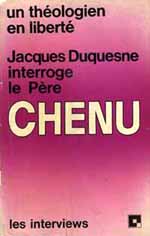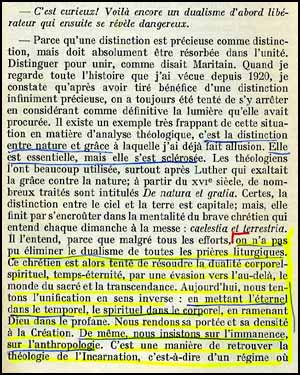Explaining the end of the distinction between nature & grace - a thesis of New Theology condemned in the 1930s - Fr. Marie Dominique Chenu goes even further. He pretends there is also no longer a distinction between the corporal & spiritual and the temporal & eternal.
What he presents is an immanent theology, whereby God could only be perceived in visible realities. He goes so far as to condemn the notion of God as a pure spirit as a false God and an idol, echoing the Marxists.
At right, the cover of an book-interview where Chenu responds to the questions of journalist Jacques Duquesne. Below right, the French text; below left, our translation of the part highlighted in yellow.
This dualism cannot be eliminated from all liturgical prayers. The Christian is tempted to resolve the corporal-spiritual, time-eternity duality by an evasion, that is, by escaping to the world beyond, the world of the sacral and the transcendent. Today we are attempting the unification in an opposite sense: by placing the eternal into the temporal, the spiritual into the corporal, by bringing God back into the secular world. We are giving to Creation its due extension and density.
Analogously, we are insisting on immanence, anthropology. It is a way of rediscovering the theology of the Incarnation, that is, a regime where God is on the earth. I can only perceive the presence of God, his economy and his providence in earthly events. Otherwise, I make of him a false god, an idol, an abode for evasion and, as the Marxists say, of alienation.
(Marie-Dominique Chenu, Jacques Duquesne interroge le Pere Chenu, Paris: Centurion, 1975, pp. 79-80)
|



|
|
